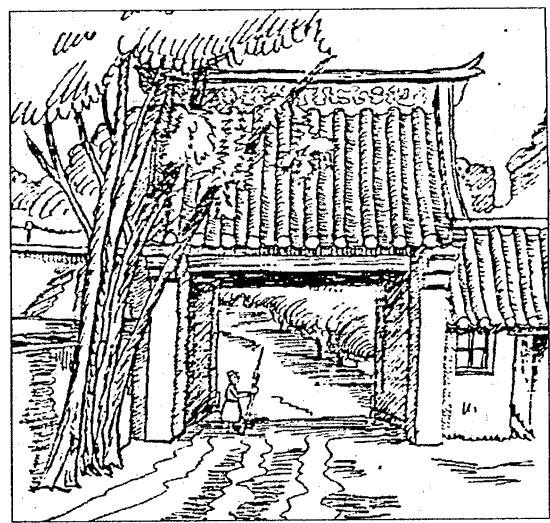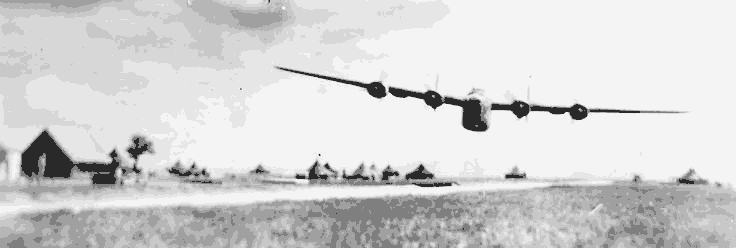
The front gate of Weifang camp, through which hundreds of prisoners rushed to welcome their liberators ...
50 Years Ago
Journey To Freedom
On the eve of the anniversary of VJ Day, Dr Norman Cliff recalls his rescue from Weifang prison camp in north China.
On a hot day in August 1945, in Weihsien (now known as Weifang) away in the countryside of Shandong, north China, 1,500 civilian prisoners of the Japanese, including a hundred children of missionaries with the China Inland Mission, were doing their normal manual tasks - pumping water, stirring thin soup in large Chinese cauldrons, chopping wood and sifting coal.
For over two years, all the "enemy subjects" of north China had been kept prisoner behind electrified wires in this former mission compound, 200 yards by 150 yards.
They were a motley crowd of people - from very young to very old, all in tattered clothes and with sunburnt complexions. They were a microcosm of any modern metropolis.
There were Protestant missionaries of many societies, Catholic priests and nuns of many orders, businessmen of the large, commercial companies, professors and teachers of various educational institutions, night club musicians, as well as the dropouts of Western society.
What they knew about events in the outside world, and of the war theatre in particular, was meagre indeed.
One night 14 months previously, when the Japanese soldiers were changing guard and therefore momentarily disorganised, and the full moon shining on the sentry tower cast its long shadow over a large area of the outside wall, two men had made a well planned escape, with the help of fellow prisoners, through the electrified wires. They had joined a guerrilla band 100 miles from the camp. Later, an American plane parachuted a radio to them.
Ingenious.
These two men had been conveying the barest news of the war to the Weihsien camp prisoners in a most ingenious way.
Chinese labourers entered the camp daily to clear the cess pools. At the gates, they were carefully searched by Japanese guards, and often were hit with the butts of rifles.
One of their number had information wrapped in a pellet stuffed up his nose, and on passing a particular rubbish dump, cleared his sinuses and thus discharged his message.
From these terse newsflashes, it was clear to the prisoners that Japan was losing the war in the Far East, and was on the point of surrender.
This was good news indeed, but it held with it fear and uncertainty. Japanese guards had told some internees by gestures that should their country lose the war, they would shoot us, and then fall on their swords.
Thus it was that on Friday 17 August 1945, the prisoners in Weihsien heard the distant drone of a plane. The sound grew louder, and somehow it sounded more musical than the Japanese planes they had heard in recent years.
Instinctively each person felt: `This is it - the end is here!' Dropping their work, hundreds of people rushed outside, and looked skywards.

The welcome news from the sky ...
Excitement
An American B24 was flying overhead, trying to identify the camp from the many Chinese villages in the countryside. Soiled British and American flags, which had been concealed in the bottoms of trunks "for the duration" were hastily unpacked and waved to the sky.
 The plane circled lower and lower, closer and closer, and then, believe it or not beyond the treetops in front of the main gate it disgorged a parachute with an airman, who came fluttering gently down. Then six others in quick succession.
The plane circled lower and lower, closer and closer, and then, believe it or not beyond the treetops in front of the main gate it disgorged a parachute with an airman, who came fluttering gently down. Then six others in quick succession.
Pandemonium followed. Prisoners cheered, danced and shouted with excitement. Ignoring the existence of Japanese guards and camp regulations, which had controlled their every move out of the front gate to welcome their liberators from the skies.
Racing across the cornfields, they found the new arrivals lying behind mounds (which were Chinese graves), poised with guns and ready for any eventuality. They were soon hoisted shoulder high, and carried as heroes into the camp.
The following weeks brought many changes to our mode of living. The sudden cessation of fighting in the Pacific meant that supplies of food, medicines and clothes were no longer needed in the war theatre, and so these were dropped over civilian camps in Weihsien and Shanghai.
Planes arrived almost daily, bringing packages of powdered milk, butter, Spam, chocolate, sugar, as well as khaki uniforms, underwear and medical drugs.
 I stood one day in front of the Japanese guard room, looking up into the sky. Blue, green and red parachutes were floating down from the silver bellies of American military planes onto the cornfields half a mile in front of me.
I stood one day in front of the Japanese guard room, looking up into the sky. Blue, green and red parachutes were floating down from the silver bellies of American military planes onto the cornfields half a mile in front of me.
All the things which we had so desperately needed during those two years of imprisonment were falling from the skies in abundance. Manna was coming down from heaven. I recalled the words of the psalmist: "Thou spreadest a table before me in the presence of mine enemies. My cup runneth over. Surely goodness and mercy shall follow me all the days of my life; and I will dwell in the house of the Lord forever" (Psalm 23).
On 25 September, five weeks after our dramatic rescue from the skies, I clambered on to a lorry with other internees. We were at last going out into the world outside to rejoin our parents and live lives of freedom.
As we travelled to the station, leaving behind that large property with wires around it, which had been our involuntary home all those months, I could not help thinking also of the spiritual and practical lessons which I had learned inside those walls.
An American missionary and camp leader had written in a friend's autograph album these perceptive words: "Weihsien is the test - whether a man's happiness depends on what he has, or what he is; on outer circumstances or inner heart; on life's experiences, good and bad - or on what he makes out of the materials these experience provide." Or, as Alexander SOLZHENITSYN wrote after he left his Soviet cell: "Bless you prison, bless you for having been in my life." Or, as the apostle Paul could say: "We know that all that happens to us is working for our good, if we love God and are fitting into his plans" (Romans 8:28, Living Bible).
#


 The plane circled lower and lower, closer and closer, and then, believe it or not beyond the treetops in front of the main gate it disgorged a parachute with an airman, who came fluttering gently down. Then six others in quick succession.
The plane circled lower and lower, closer and closer, and then, believe it or not beyond the treetops in front of the main gate it disgorged a parachute with an airman, who came fluttering gently down. Then six others in quick succession. I stood one day in front of the Japanese guard room, looking up into the sky. Blue, green and red parachutes were floating down from the silver bellies of American military planes onto the cornfields half a mile in front of me.
I stood one day in front of the Japanese guard room, looking up into the sky. Blue, green and red parachutes were floating down from the silver bellies of American military planes onto the cornfields half a mile in front of me.



